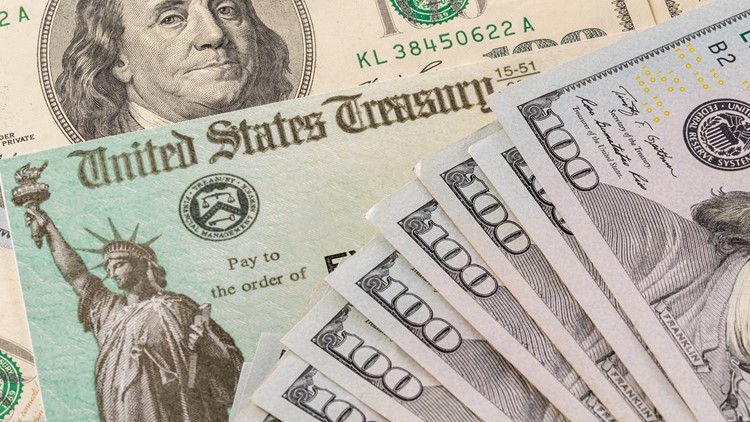WASHINGTON, D.C., USA — The U.S. House of Representatives will put the $1.9 trillion American Rescue Plan to a full vote Friday night.
A virtual party-line House vote is expected on the COVID-19 relief measure, which embodies President Joe Biden's push to flush cash to individuals, businesses, states, and cities. The package would provide $1,400 payments to individuals, extend emergency unemployment benefits through August, and increase tax credits for children and federal subsidies for health insurance coverage.
Ahead of the highly anticipated vote, Maine Democratic Rep. Chellie Pingree said she plans to vote to pass the package.
“With high unemployment and interest rates at zero, economists have made it clear that we cannot afford to go small with this stimulus package. The pandemic has claimed over 500,000 American lives and destroyed the livelihoods of millions. In Maine, more than 700 people have died from this deadly virus, a quarter of residents are behind on their rent, an estimated 215,000 are grappling with food insecurity, and more than 100,000 lost their jobs at some point in 2020. The cost of inaction is unacceptable,” Pingree said in a statement.
“So tonight, I will vote for the American Rescue Plan to put money in the pockets of Mainers who are in crisis, make investments to stabilize our economy, and crush the virus with funding to improve testing and vaccine distribution,” she continued. “We are just days away from pandemic unemployment benefits running out. Last year Republicans stalled a stimulus package so long it caused a painful lapse in jobless benefits. It would be irresponsible for us to allow that to happen again, especially when economists estimate that investing in job-seekers could create or save over five million jobs.”
Maine Rep. Jared Golden is only one of two Democrats who voted against the stimulus bill.
In a statement, Rep. Golden wrote, “During challenging times, the country needs its elected leaders to work together to meet the most urgent needs in their communities. This bill addresses urgent needs, and then buries them under a mountain of unnecessary or untimely spending. In reviewing the bill in its full scope, less than 20 percent of the total spending addresses core COVID challenges that are immediately pressing: funding for vaccine distribution and testing, and emergency federal unemployment programs. I support these portions of the bill wholeheartedly and believe we should do more for the people hardest hit by the pandemic by continuing to extend unemployment programs until economic indicators show they are no longer necessary.
“Unfortunately, the path congressional leaders have chosen goes far beyond these key provisions, to the tune of hundreds of billions of dollars. After supporting $4 trillion in emergency COVID relief in 2020, I won’t support trillions more in funding that is poorly targeted or in many cases not necessary at this moment in time."
We are expected to hear more from Rep. Golden on Saturday afternoon.
Republicans have lined up against the plan, calling it an overpriced and wasteful attempt to help Democratic allies like labor unions and Democratic-run states.
The bill is “a partisan circus” designed to “quickly notch some wins for the president's buddies,” said Rep. Jason Smith, R-Mo., top Republican on the House Budget Committee.
That's making the fight a showdown over which party voters will reward for approving added federal spending to combat the coronavirus and revive the economy, on top of $4 trillion previously passed. The pandemic has killed a half-million Americans, thrown millions out of work and reconfigured the daily lives of nearly everyone from coast to coast.
The battle is also emerging as an early test of Biden's ability to hold together his party's fragile congressional majorities — just 10 votes in the House and an evenly divided 50-50 Senate.
At the same time, Democrats were trying to figure out how to respond to Thursday night's jarring setback in the Senate.
That chamber's nonpartisan parliamentarian, Elizabeth MacDonough, said Senate rules require that a federal minimum wage increase would have to be dropped from the COVID-19 bill, leaving the proposal on life support. The measure would gradually lift that minimum to $15 hourly by 2025, doubling the current $7.25 floor in effect since 2009.
Traditionalist senators of both parties, including Biden, a senator for 36 years, have opposed eliminating filibusters because they protect parties' interests when they are in the Senate minority. Biden also said weeks ago that he didn't expect the minimum wage increase to survive the Senate's rules.
The House COVID-19 bill includes the minimum wage increase, so the real battle over its fate will occur when the Senate debates its version over the next two weeks.
Pingree said in a Tweet Thursday that she would still vote to pass raising the minimum wage.
“I am 100 percent a yes to #RaiseTheWage!”
Democrats are pushing the massive coronavirus relief measure through Congress under special rules that will let them avoid a Senate GOP filibuster, meaning that if they are united they won't need any Republican votes.
It also lets the bill move faster, a top priority for Democrats who want the bill on Biden's desk by the time the most recent round of emergency jobless benefits end on March 14.
But those same Senate rules prohibit provisions with only an “incidental” impact on the federal budget because they are chiefly driven by other policy purposes. MacDonough decided that the minimum wage provision failed that test, according to aides who described her decision on condition of anonymity because it hadn’t been publicly released.
Republicans oppose the $15 minimum wage target as an expense that would hurt businesses and cost jobs.
The House is expected to vote on the package around 9 p.m. Friday night, a spokesperson for Pingree said.
Maine Democratic Rep. Jared Golden did not immediately respond to request for comment ahead of the vote.



